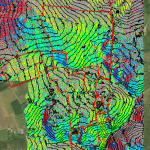Publication: Climate Change & UK Viticulture
Impact of recent climate change and weather variability on the viability of UK viticulture – combining weather and climate records with producers ’ perspectives.
Extensive research conducted by Vinescapes Dr Alistair Nesbitt and colleagues from the University of East Anglia, and Brock University in Canada, into climate change impacts on UK viticulture has been published in the world renowned wine science journal: the Australian Journal of Grape and Wine Research, and it was noted to be the most downloaded paper in 2017, demonstrating impact and scientific merit.
The paper, summarised below, can be accessed here.
From 2004 to 2013, the vineyard area in the United Kingdom (UK) increased 148%. Observed climate change and underlying weather variability were assessed for their influence on the development and viability of UK viticulture. The perspectives of grape-growers in the UK on climate change and weather variability were complemented by a quantitative analysis of climate and weather data (1954–2013) for the main UK viticultural regions. The variability of growing season average temperature (GST) was calculated and also mapped using a modelling approach. Since 1993, GST has consistently been above the 13°C cool climate viticulture threshold. Alone, GST does not reliably assure yield predictability but does correlate more closely following the recent increasing UK focus on sparkling wine cultivars. June precipitation demonstrates the strongest relationship with yield. Increasing GST superficially suggests enhanced UK cool climate viticultural opportunities, but critically masks the additional impact of shorter term temperature and precipitation events and a high degree of inter‐annual variability that continues to threaten productivity. A recent change in dominant UK vine cultivars appears to have increased viticultural sensitivity to inter‐annual weather variability. This first quantitative and qualitative analysis of climate vulnerability in UK viticulture identifies threats and opportunities and helps steer studies of the impact of future climate change.





